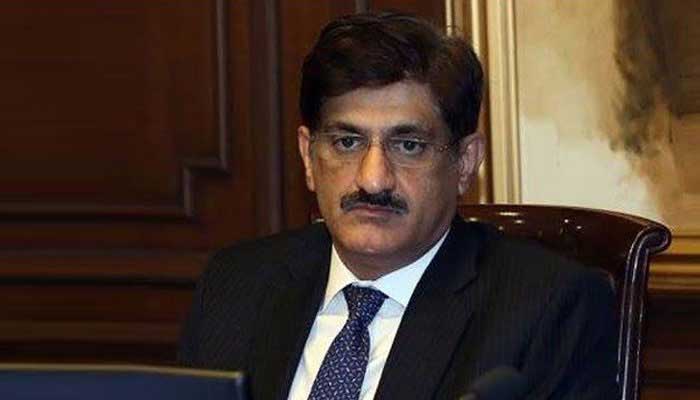World Bank to help develop Karachi drainage system, remove LBOD design defects
Sindh’s chief minister said on Wednesday that this year’s heavy monsoon rains have wreaked havoc on Karachi and Mirpurkhas divisions, so he has asked the NED University of Engineering & Technology to conduct a study on Karachi’s drainage system.
Talking to World Bank Country Director for Pakistan Najy Benhassine, who called on the chief executive at the CM House, Syed Murad Ali Shah said he has also decided that necessary changes will soon be made to the design of the Left Bank Outfall Drain (LBOD).
Shah said the heavy rains had caused urban flooding in Karachi as well as inundated hundreds of villages in Mirpurkhas Division and parts of the Hyderabad division. He said he has tasked the NED University with conducting a study on Karachi’s drainage system and suggesting ways and means to improve it so that the disposal of water can be made through natural gravity.
He told the meeting that the university has started its study and it will be completed within the next two months, following which the city’s drainage system will be designed accordingly. He said WB experts should help with designing a modern drainage system for the city.
The CM said that there are design defects in the 385-kilometre LBOD, which starts flowing backwards during high tide in the sea. “Therefore, instead of disposing of saline water or rainwater, the LBOD starts submerging the nearby localities.”
Therefore, he said, he has decided that design defects will be removed from the LBOD. He urged the WB to provide technical assistance to the provincial government in removing design detects from the drain. Benhassine said his technical team will extend full support to the Sindh government in developing a proper drainage system in Karachi and removing design defects from the LBOD.
Yellow Line
The meeting was told that the WB is going to construct the 61-billion-rupee, 22km Yellow Line bus rapid transit (BRT) corridor in Karachi, including its infrastructure, drainage, lighting, busways, stations, terminal and depot.
Shah said Yellow Line is the most important project for the city. He added that it has been developed primarily along the Korangi and Korangi Industrial Area roads connecting the city’s south-eastern parts (Korangi Town, Landhi Town and Bin Qasim town) considered large and dense industrial and residential areas.
He said the WB is preparing its design but it needs to be expedited so that the project can be taken up for development. Benhassine assured the chief executive that the design of the project will be completed soon.
The BRT project will have a 1km mixed route on Sharea Faisal, with eight underpasses and two elevated U-turns, 268 buses and 28 stations, 22 of which will be at grade and the remaining six at underpasses.
Property surveys
The meeting also discussed the need of conducting property surveys in Karachi and Hyderabad. Planning & Development Board Chairman Mohammad Waseem said that the last property survey in Karachi was conducted in 2001 by the excise & taxation department, and now it will be conducted by WB experts.
It was pointed out that only Rs2 billion in property taxes was collected from the city, which is lower than even Lahore.
The meeting was told that after Karachi, the Sindh government wants to conduct a property survey in Hyderabad so that property tax recovery can be increased there as well.
The CM said that the funds collected as property taxes are being used by the local bodies. “If the recoveries are improved, they will financially strengthen the local bodies.” The meeting also discussed a large number of WB-sponsored ongoing and new projects, and agreed to review the performance of the entire portfolio very soon.
The meeting was also attended by Chief Secretary Mumtaz Ali Shah, CM’s Principal Secretary Sajid Jamal Abro and WB Operations Manager for Pakistan Melinda Good.
-
 What You Need To Know About Ischemic Stroke
What You Need To Know About Ischemic Stroke -
 Shocking Reason Behind Type 2 Diabetes Revealed By Scientists
Shocking Reason Behind Type 2 Diabetes Revealed By Scientists -
 SpaceX Cleared For NASA Crew-12 Launch After Falcon 9 Review
SpaceX Cleared For NASA Crew-12 Launch After Falcon 9 Review -
 Meghan Markle Gives Old Hollywood Vibes In New Photos At Glitzy Event
Meghan Markle Gives Old Hollywood Vibes In New Photos At Glitzy Event -
 Simple 'finger Test' Unveils Lung Cancer Diagnosis
Simple 'finger Test' Unveils Lung Cancer Diagnosis -
 Groundbreaking Treatment For Sepsis Emerges In New Study
Groundbreaking Treatment For Sepsis Emerges In New Study -
 Roblox Blocked In Egypt Sparks Debate Over Child Safety And Digital Access
Roblox Blocked In Egypt Sparks Debate Over Child Safety And Digital Access -
 Savannah Guthrie Addresses Ransom Demands Made By Her Mother Nancy's Kidnappers
Savannah Guthrie Addresses Ransom Demands Made By Her Mother Nancy's Kidnappers -
 OpenAI Reportedly Working On AI-powered Earbuds As First Hardware Product
OpenAI Reportedly Working On AI-powered Earbuds As First Hardware Product -
 Andrew, Sarah Ferguson Refuse King Charles Request: 'Raising Eyebrows Inside Palace'
Andrew, Sarah Ferguson Refuse King Charles Request: 'Raising Eyebrows Inside Palace' -
 Adam Sandler Reveals How Tom Cruise Introduced Him To Paul Thomas Anderson
Adam Sandler Reveals How Tom Cruise Introduced Him To Paul Thomas Anderson -
 Washington Post CEO William Lewis Resigns After Sweeping Layoffs
Washington Post CEO William Lewis Resigns After Sweeping Layoffs -
 North Korea To Hold 9th Workers’ Party Congress In Late February
North Korea To Hold 9th Workers’ Party Congress In Late February -
 All You Need To Know Guide To Rosacea
All You Need To Know Guide To Rosacea -
 Princess Diana's Brother 'handed Over' Althorp House To Marion And Her Family
Princess Diana's Brother 'handed Over' Althorp House To Marion And Her Family -
 Trump Mobile T1 Phone Resurfaces With New Specs, Higher Price
Trump Mobile T1 Phone Resurfaces With New Specs, Higher Price




